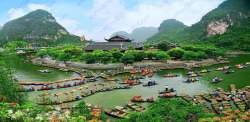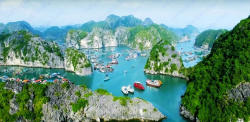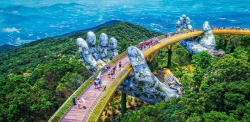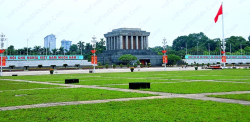Discover the beauty of Ba Vi National Park in Hanoi
Listing Details
Hanoi, Ha Noi
1 year ago
Additional Details
68
3.6k
Description
Ba Vi National Park is a stunning natural wonderland located in Vietnam, known for its breathtaking landscapes, rich biodiversity, and cultural significance. Situated just 60 kilometers west of Hanoi, the park offers a serene retreat from the bustling city life and provides visitors with an opportunity to immerse themselves in nature's beauty.
With its lush forests, towering mountains, and ancient temples, Ba Vi National Park is a paradise for nature enthusiasts, adventure seekers, and those seeking a deeper connection with the natural world.
1. Geography and Climate:
Ba Vi National Park covers an area of approximately 11,000 hectares, encompassing three main mountains: King Peak (1,296 meters), Tan Vien Peak (1,226 meters), and Ngoc Hoa Peak (1,120 meters). The park is situated within the Ba Vi Mountain Range, which is part of the larger Hoang Lien Son Range.
The park's location in the Red River Delta region results in a diverse climate. Summers are typically hot and humid, while winters are cooler and foggy. The annual average temperature ranges from 18 to 25 degrees Celsius, making it an ideal destination to visit throughout the year.
2. Flora and Fauna:
Ba Vi National Park boasts a remarkable array of plant and animal species. The park is home to over 1,200 plant species, including various rare and endangered plants. Dense evergreen forests cover the lower elevations, transitioning into mixed deciduous forests as you ascend the mountains. This diverse vegetation provides habitat for a wide range of animal species, such as macaques, civets, squirrels, and numerous bird species.
Moreover, Ba Vi National Park is renowned for its orchid diversity, with more than 200 species found within its boundaries. Visitors can witness these vibrant flowers in full bloom, adding to the park's enchanting atmosphere.
3. Cultural and Historical Significance:
Beyond its natural wonders, Ba Vi National Park holds great cultural and historical significance for the Vietnamese people. The park is home to several ancient temples and pagodas, including the Thien Son Suoi Nga Temple and the Thuong Temple. These sacred sites have been attracting pilgrims for centuries and offer visitors a glimpse into the spiritual traditions of Vietnam.
Additionally, Ba Vi National Park was the location of a former French hill station during the colonial era. The remnants of this period can still be seen in the park, with structures like the Ba Vi Governor's Residence and the Ba Vi Church serving as reminders of Vietnam's complex history.
4. Activities and Attractions:
Ba Vi National Park provides a wide range of activities and attractions to suit different interests. For nature lovers, the park offers countless hiking trails that lead through dense forests, past cascading waterfalls, and up to the mountaintops. The summit of King Peak provides a panoramic view of the surrounding landscape, including the Red River Delta and the distant city of Hanoi.
Visitors can also enjoy birdwatching, as Ba Vi National Park is a birding hotspot with over 300 bird species recorded. Keen-eyed birdwatchers may spot rare species such as the red-billed blue magpie and the crested serpent eagle.
For those seeking a spiritual experience, the temples and pagodas in the park offer a serene setting for meditation and reflection. The Thien Son Suoi Nga Temple, located near a picturesque waterfall, is particularly popular among visitors.
Furthermore, Ba Vi National Park features accommodation options ranging from cozy guesthouses to luxurious resorts, allowing visitors to extend their stay and fully immerse themselves in the park's beauty.
5. Conservation Efforts and Future Challenges:
Preservation and conservation efforts play a crucial role in safeguarding the natural and cultural heritage of Ba Vi National Park. The Vietnamese government, in collaboration with local communities and environmental organizations, is actively involved in protecting the park's biodiversity and raising awareness about its importance.
However, like many other natural areas around the world, Ba Vi National Park faces challenges such as deforestation, illegal hunting, and the encroachment of human settlements. These threats emphasize the need for sustainable tourism practices, community engagement, and ongoing conservation initiatives to ensure the park's long-term survival.
6. Good to know
Entrance Ticket: 60,000 VND for adults
What should bring: trekking shoes.
When planning your visit to Ba Vi National Park, there are a few important tips to keep in mind to ensure a safe and enjoyable experience. Whether you're an adventure enthusiast or a nature lover, these guidelines will help you make the most of your time in the park.
+ Be Mindful of Rainy Days:It is advisable to avoid visiting Ba Vi National Park on rainy days. The roads can become slippery, increasing the risk of accidents. Additionally, areas with small waterfalls, muddy water, or still water should be avoided, as they may harbor leeches and other creepy creatures. Check the weather forecast before your trip and plan accordingly.
+ Use Insect Repellent:To protect yourself from mosquitoes and other insects, apply insect repellent before entering the park. This will help minimize the risk of insect bites and potential discomfort during your visit.
+ Ideal Time to Visit:The best time to explore Ba Vi National Park is during the summer and autumn months, from April to November. During this period, the city can be hot and stuffy, but once you step into Ba Vi, you'll feel as if you've entered a different world. The air is fresh, cool, and exceptionally serene. However, be cautious of rainy days during this season, as mentioned earlier.
+ Consider Winter Conditions:Winter in Ba Vi National Park can be cold and foggy, affecting visibility. If you plan to visit during the winter months, be prepared for lower temperatures and limited visibility due to fog. However, winter in Ba Vi also has its unique beauty. If you're up for the challenge and appreciate the serene atmosphere, you can still embark on an unforgettable adventure in Ba Vi National Park.
By following these tips, you can enhance your safety and comfort while exploring the wonders of Ba Vi National Park. Always prioritize your well-being, respect the natural environment, and cherish the unique experiences that this remarkable destination has to offer.
Conclusion:
Ba Vi National Park is a treasure trove of natural beauty, biodiversity, and cultural significance. With its stunning landscapes, diverse flora and fauna, and historical sites, the park offers an unforgettable experience for all who venture into its embrace. Whether you seek adventure, tranquility, or a deeper connection with nature, Ba Vi National Park is a destination that will leave you in awe and inspire you to appreciate and protect our planet's natural wonders.
Show More














